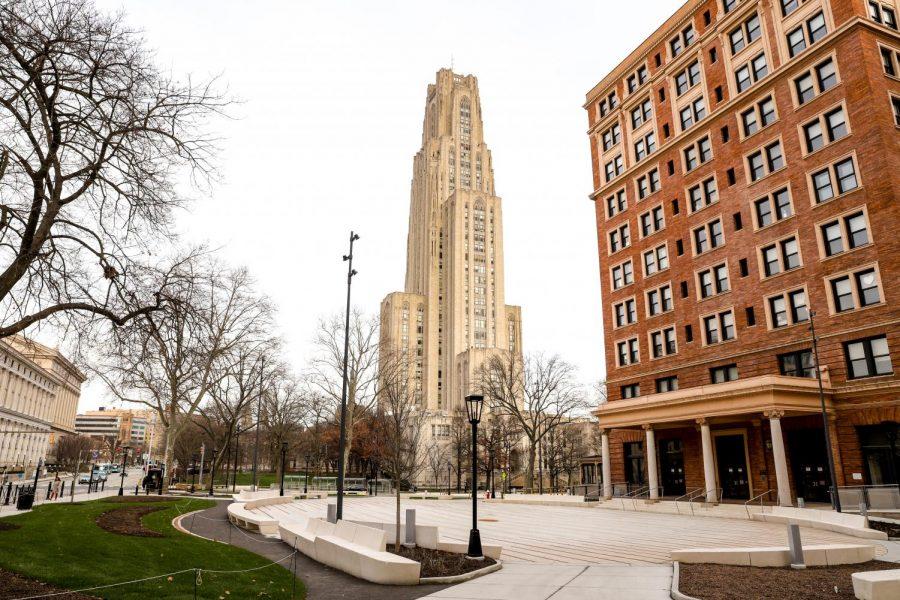Local nonprofit partners with Pitt to ‘bridge digital divide’


Allentown-based nonprofit “Meta-Mash” partnered with Pitt last year to place a fiber connection on top of the Cathedral of Learning and provide free residential internet access to people in underserved areas.
Sam Garfinkel said when COVID-19 forced jobs, school and even medical appointments online, it “brought into the spotlight” the issue of digital inequity — meaning the unequal access to technology across socioeconomic levels.
“The digital divide has existed since the internet came on, and unfortunately the field had a lot of difficulty getting people to even acknowledge the issue, let alone fund the problem,” Garfinkel, Meta Mesh Wireless Communities’ interim director, said. “The pandemic really changed the tone and put a lot of urgency behind this issue.”
Allentown-based nonprofit Meta Mesh partnered with Pitt — alongside several other Pittsburgh universities and community organizations — last year to create an initiative called Every1online. The initiative aims to “bridge the digital divide” by providing residential internet access to people in under-served areas at no cost to those signed up for their service.
MMWC purchases bandwidth from a fiber provider and uses a wireless internet service provider to redistribute it wirelessly at the top of the Cathedral of Learning. The WISP “hub” beams bandwidth to antennas installed at participating residences, which connect to in-home routers.
“It’s different from other internet provider options that are local to Pittsburgh, because one, we’re a nonprofit, and then I think we’re one of very few nonprofit internet service providers in the country,” Garfinkel said. “It’s a very different way of thinking about internet services than what we’re all used to.”
According to Garfinkel, the MMWC business model is based on a “sponsorship approach” — meaning that community partners cover the cost of internet services for each home, mainly through federal education grants. Currently, these partners include Homewood Children’s Village, the Cornell School District in Coraopolis and the New Kensington Arnold School District.
“They actually cover the costs of the internet services to the end user, because it’s so important for their community members to get online.” Garfinkel said.
MMWC spent most of 2020 and the first half of 2021 completing the infrastructure necessary for home installations, which began in August. Currently, 10 residential users are connected to MMWC’s Wi-Fi, as well as several parks such as Shelly Jones Memorial Park, the Coraopolis Gazebo, Neville Island’s Memorial Park, Marion Gerardi Memorial Park and Tustin Tot Lot.
Despite facing uncertainties about the logistics of the project, Garfinkel said the initiative has been mostly successful.
“I’d say we’re seeing a lot of success for our first time, kind of novel project,” Garfinkel said. “We kind of started all of this, not really knowing what it would take or what it would cost or how much time it would take to really envision this because no one has ever really done this before and definitely not here in Pittsburgh.”
Although installations are underway, Garfinkel said it isn’t too late to apply for MMWC Wi-Fi. She encourages residents interested in signing up to either give MMWC a call or to apply on the website.
“We really want people to be aware that we’re still accepting submissions for Homewood and Coraopolis,” Garfinkel said. “A lot of the time, people are like, this is too good to be true, or you know, we just don’t have the same kind of name recognition as a lot of larger providers.”
Kostas Pelechrinis, a Meta Mesh collaborator and an associate professor of information sciences at Pitt, is currently conducting research on digital equity during the pandemic. Pelechrinis wrote a survey that identified problems students in the New Kensington School District had accessing schoolwork on the internet.
Pelechrinis described the results of the survey — which garnered more than 100 responses — as “eye-opening.” He said even if people have access to certain technologies, they may lack access to knowledge about the technology.
“One of the very first questions that we asked people was whether they have broadband network in their house and there was about 10% of the people that didn’t know,” Pelechrinis said. “Sometimes even the teachers do not know how to use and how to solve some of the problems that they face with technology. So really it’s not only a matter of access to technology, but also how do you educate and provide this computing literacy to the new generations to be able to take advantage of the possibilities.”
Pelechrinis said Pitt IT is working to provide some of the “computing literacy” through a help desk people can call to work through problems with IT professionals.
“If someone gets connected with Meta Mesh and they have problems with their router or problems with their connection in general they can call the help desk,” Pelechrinis said. “It may not sound as big a thing, but it’s a really important service when people don’t have the knowledge to try and solve the problems themselves.”
Mark Henderson, the chief information officer at Pitt and member of MMWC’s board said he believes “Every1online complements Pitt’s other technology-focused community initiatives,” such as the Community Technology Help Desk, Pitt Cyber and Pitt IT’s annual CyberCamp for high school students. According to Henderson, Pitt IT and SCI are also developing a program for the University’s Community Engagement Center to provide local high school seniors with training for a career as an IT help desk professional.
“We’re creating digital pathways for school-aged children who may not otherwise have the same access to online resources as their peers from more affluent neighborhoods,” Henderson said. “Equal access to technology and developing digital literacy skills are absolutely critical for giving all children, no matter what their financial circumstance, the opportunity to succeed.”
Henderson said he “takes his hat off” to the team for all they’ve been able to accomplish so far.
“Our partnership with Meta Mesh has fantastic potential for the University to contribute in a significant way to the communities around our campuses and beyond,” Henderson said. “I’m really proud to have this opportunity for Pitt IT to leverage our expertise to tackle this pressing challenge.”
Recent Posts
Porch roof collapse injures dozens during party on Semple Street
The roof of a porch on Semple Street collapsed during a St. Patrick’s Day celebration…
A Good Hill to Die On // Break It Down
In this release of “A Good Hill to Die On,” I dive deep into the…
Who Asked? // Does growth only “count” if it’s quantifiable?
This installment of Who Asked? by staff writer Brynn Murawski wonders why it feels like…
“They’re throwing trans people under the bus”: Counseling center faces backlash after event name change
On Feb. 24, Pitt’s Counseling Center faced backlash after briefly renaming an event from "LGBT…
Q&A: Meet the 2024-2025 SGB president and vice president
SGB announced the 2024-2025 election results at their meeting on Tuesday. The Pitt News spoke…
Editorial | Pitt Administration must listen to its students’ electoral demands
The passing of these referendums does not guarantee a future Pitt with these policies. Merely,…

